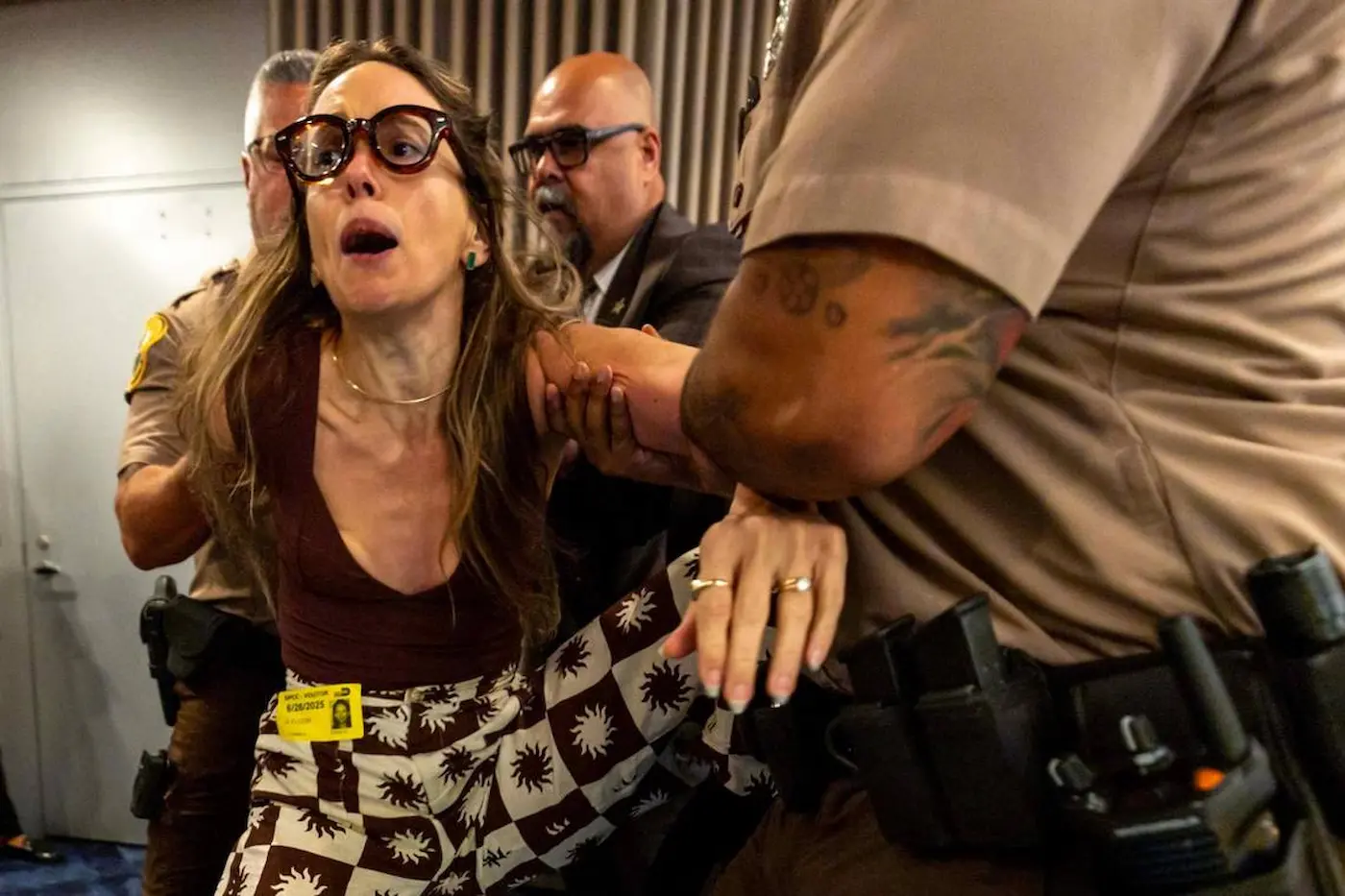|
Getting your Trinity Audio player ready... |
Tabla de Contenido/ Table of Contents
- 1 Scandal in Miami-Dade and the Dialogue Dilemma: Listen to the People or Govern by Decree? Is this democracy or just a parody of participation?
- 1.1 The Symptom of a Rigid System
- 1.2 The Cost of Governing Without Dialogue
- 1.3 The Facts: A Right to Speak That Ends in Arrest
- 1.4 The Background: Opaque Process and Contradictory Messages
- 1.5 The Deeper Debate: ICE, the Law, and the Responsibility of the Elected
- 1.6 The Voice of the Community: Eroded Trust
- 1.7 What Does the Law Say?
- 1.8 Lessons from Washington: The Byron Donalds Example
- 1.9 Urgent Reforms to Restore Trust
- 1.10 “America First” Is Not a Slogan, It’s a Responsibility
Scandal in Miami-Dade and the Dialogue Dilemma: Listen to the People or Govern by Decree? Is this democracy or just a parody of participation?
MIAMI, FL — At the heart of every healthy democracy beats a fundamental principle: the right of citizens to be heard. However, what happened at the latest Miami-Dade County board meeting highlights an uncomfortable truth: public dialogue is in danger and our institutions seem more concerned with controlling the narrative than confronting the real issues.
The Symptom of a Rigid System
Every month the scene repeats: lines of residents waiting to be heard, only to discover their interventions are limited to 60 seconds. Complex problems—from security to housing, including immigration and civil rights—are reduced to a timed minute, while official responses hide behind technicalities and formalities.
Is this democracy or just a parody of participation? When a government limits the citizen voice, it sends a clear message: discomfort is dangerous, criticism is suspicious, and order matters more than truth.
The Cost of Governing Without Dialogue
What happened in Miami-Dade is not an isolated case, but the result of decades of policies and administrations—both Republican and Democrat—that have tolerated or perpetuated a rigid system, unable to adapt to the challenges of a nation under internal and external pressure.
In the immigration case, it is essential to remember that those who enforce the law—ICE agents and security forces—do not act on a whim, but under legal mandate. In a country where threats are real and multiple, from inside and out, we cannot afford to weaken the institutions that guarantee our security. While many criticize the United States’ role as “the world’s police,” it is these same soldiers and agents who step in to resolve global conflicts and protect our borders.
But enforcing the law does not mean repressing dialogue. On the contrary: silencing uncomfortable questions only strengthens those who, from within, seek to destroy the foundations of this nation. True leadership knows how to respond with law, morals, and reason, without falling into the temptation of bureaucratic authoritarianism.
The Facts: A Right to Speak That Ends in Arrest
Camila Ramos, a local resident and real estate agent, came to the meeting to exercise her legitimate right to question a new collaboration agreement between the county and Immigration and Customs Enforcement (ICE) in local jails. What should have been a democratic exchange turned into an embarrassing scene: Ramos was dragged out by at least three officers, handcuffed, and later charged with two felonies (battery on an officer and resisting with violence). Another attendee, Z Spicer, was also arrested.
The video and images leave no doubt about the seriousness of the moment: protests in the room, chants of “Let her speak,” confusion, and a disproportionate response to a simple question about the process and the right to speak.

The Background: Opaque Process and Contradictory Messages
What’s most worrying is not just the arrest of a citizen seeking clarity, but the context in which this occurs:
- The board president, Anthony Rodriguez, warned that anyone who chose to speak would lose the right to intervene in future votes on the ICE agreement.
- Mayor Daniella Levine Cava argued that state law obligates her to ratify the agreement, but that “it is not the wish of this body.”
- The vote was finally deferred indefinitely, allowing Levine Cava’s signature (dated March) to take retroactive effect, without real discussion or vote by the full board.
Experts and activists have denounced confusion, unclear messages from the commissioners’ table, and above all, the intention to “wash their hands” to avoid political responsibility.
The Deeper Debate: ICE, the Law, and the Responsibility of the Elected
Miami-Dade’s cooperation with ICE has historically been controversial. Under federal pressure, the county has swung between full cooperation (to avoid losing federal funds) and protecting migrant communities from prolonged detentions. The current agreement includes compensation for the county and certain restrictions on record disclosure, which critics say could hinder the defense of rights for detained immigrants.
However, beyond the immigration debate, the essential question remains:
Are we facing a county government willing to listen and respond to its citizens, or an administration more interested in controlling the narrative, minimizing dissent, and facilitating controversial decisions outside public scrutiny?
The Voice of the Community: Eroded Trust
Many community leaders, such as Silvia Muñoz and Jose Domínguez, expressed widespread fear and distrust of institutions. “Our people are afraid,” they said. The attitude of president Rodriguez, in conditioning the right to speak, only increased that distrust.
Confusion about the process, the officers’ actions, and the institutional response leave a sense of a “revolving door”: the public is heard only under restrictive conditions, and any dissent is treated as a threat to order.
What Does the Law Say?
Collaboration between local governments and ICE is supported by federal and state laws, such as 8 U.S.C. § 1373 and Section 908.104, Florida Statutes, which require that the exchange of information with federal authorities not be restricted and that certain agreements be honored.
However, the First Amendment and state statutes regarding citizen participation require that public boards allow the right to speak without retaliation or intimidation.
Law Authorizing Collaboration with ICE
Federal Law: 8 U.S.C. § 1373
This section of Title 8 of the United States Code prohibits any state or local government from limiting communication or the exchange of information about an individual’s immigration status with the Department of Homeland Security (DHS), which includes ICE.
In essence:
States and localities cannot prohibit or restrict their officials from sharing immigration information with ICE. This law was reinforced during the Trump administration to combat so-called “sanctuary cities.”
Section 287(g) of the Immigration and Nationality Act (INA)
The 287(g) program authorizes formal agreements between ICE and local agencies (sheriffs, police departments, jails) so that certain local officers may act with federal immigration agent functions under ICE supervision. That means counties and cities can formally collaborate on detentions, investigations, and deportations.
Federal Supremacy
The Supremacy Clause of the U.S. Constitution (Article VI, Clause 2) establishes that federal laws prevail over state and local laws. This means any federal executive order on immigration must be respected by all levels of government.
Judicial Rulings
The Supreme Court has reaffirmed in several decisions (e.g., Arizona v. United States, 2012) that immigration is primarily federal jurisdiction, but states and counties cannot obstruct federal work nor refuse to collaborate in what the law requires (while they cannot be forced to act as federal agents in all cases, they must allow the exchange of information and not block federal processes).
More legal information:
The case of Camila Ramos is a red alert for the state of local democracy in Miami-Dade. When asking about the process or questioning decisions is penalized with arrest, criminal charges, and forced silence, we are on a dangerous path. No matter which side of the debate: participation rights and transparency are the foundation of any democracy. If these are eroded, the real danger is not the law, but silence.
Sources:
Miami Herald: She wanted to speak against an ICE deal with Miami-Dade. She ended up in jail instead.
Lessons from Washington: The Byron Donalds Example
In contrast, voices like that of Congressman Byron Donalds—current federal representative and aspiring gubernatorial candidate for the state of Florida—show that a firm, intelligent, and law-abiding dialogue is possible. As he has said:
“By definition, an illegal alien has broken federal law the second they unlawfully entered the United States and is subject to deportation… ICE is doing their job to restore safety to our communities.”
While federal representatives face the immigration crisis with determination and dialogue, in Miami-Dade we remain trapped between fear of controversy and protocol paralysis. It’s time to demand from our representatives the same level of moral and legal clarity, leaving behind the habit of hiding behind the clock or the regulations.
Urgent Reforms to Restore Trust
- Realistic Citizen Participation Times: At least 3 minutes per intervention, with the possibility of extension by consensus when the topic requires it.
- Training in Mediation and Communication: Officials prepared to listen, dialogue, and resolve conflicts without reprisals.
- Proactive Transparency: Publish concrete data on complaint management and results, including action metrics and external audits.
“America First” Is Not a Slogan, It’s a Responsibility
Commitment to national security and respect for the law are not incompatible with the right to dissent. America is strong because its institutions dialogue and its citizens participate. But, to be up to this historic moment, Miami-Dade must stop fearing difficult questions and start truly listening.
Limiting public debate is a gift to extremists and a blow to local democracy. Today more than ever, it’s urgent to remember that security and freedom are built with dialogue and transparency.
📰 Want more news like this?
Visit our home page to stay up to date with the latest in South Florida and more:
Your world, a click away:
News that connects, informs, and challenges.
Did you know? We do.
AlwaysFirstNewsMiamiDade
Information without borders, truth without filters:
Your newspaper in the digital age.
Read today, lead tomorrow:
The news in your hands, no need to wait for paper.
Real-time news, unmatched analysis:
Your digital advantage.
Did you find out? We already published it.
👉 newsmiamidade.com 👈










